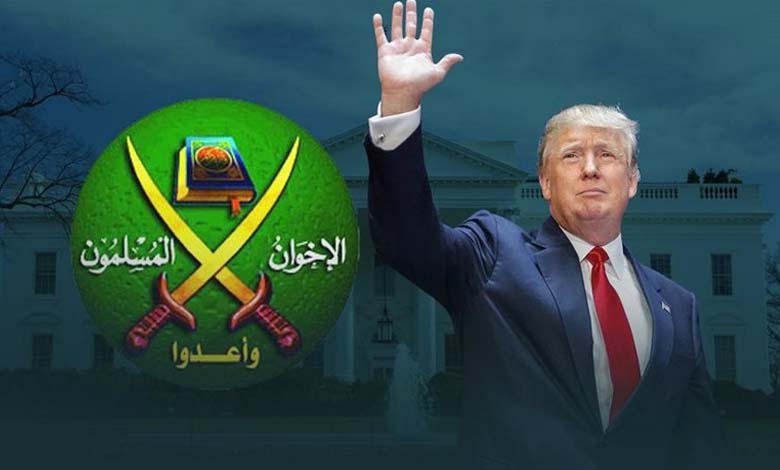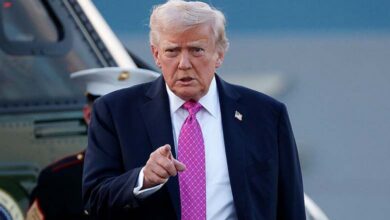The repercussions of Trump’s strike against the Muslim Brotherhood… What to expect in Europe?

The decision taken by US President Donald Trump has triggered a storm across the Muslim Brotherhood’s networks worldwide, and it is expected to have various consequences in the near future.
On Monday, the US president signed an executive order directing the launch of a process to classify the Brotherhood’s branches in Egypt, Jordan, and Lebanon as terrorist organizations, a step that accelerates the movement’s decline after nearly a century since its establishment.
-
The United States and the designation of the Muslim Brotherhood as a terrorist organization… Three steps needed to strengthen the process
-
Global map of the confrontation with the Muslim Brotherhood: bans, classifications, and diversified measures
Under the executive order signed by Trump, Secretary of State Marco Rubio and Treasury Secretary Scott Besent are required to submit a joint report to the president within thirty days regarding the designation of the Brotherhood’s branches as foreign terrorist organizations.
The decision further instructs the two secretaries to begin implementing any designations within forty-five days of submitting the report.
In this context, Germany’s leading expert on the Muslim Brotherhood, Sigrid Herrmann, stated that Trump’s decision is “a first step toward addressing the organizational structure of the Muslim Brotherhood, as the movement operates numerous associations and organizations, not only mosques.”
-
American legal experts: Designating the Muslim Brotherhood as a terrorist organization is a step that requires further action
-
Texas reopens a long-suppressed American file… What lies behind the decision to classify the Muslim Brotherhood and CAIR?
According to Herrmann, the Brotherhood’s network extends to educational organizations and charitable associations, and now encompasses additional sectors such as halal financial services, professional associations, and commercial service providers.
She added: “But the connection between each of these structures must be demonstrated individually, and in a way that is credible before the courts. There is thus a great deal of work to be done.”
Regarding the impact of Trump’s decision on the future of the Brotherhood in Europe, she said: “Initially, there will be no direct effect. Even the indirect impact will be difficult to measure. But the US decision will make it harder for organizations linked to the Brotherhood to access public funds in European countries.”
-
Texas designates the Muslim Brotherhood and CAIR as terrorist organizations: a profound American shift reshaping the domestic landscape of political Islam
-
Texas Between Security and Rights: Abbott’s Decision Against the Muslim Brotherhood and CAIR Opens a New Battle in the U.S.
The German expert expects a shift in the political or social perception of institutions associated with the Brotherhood, as well as in their funding and activities in France and the United Kingdom, following the US decision. However, she does not expect such a shift in Germany, where Brotherhood members enjoy a strong position, particularly the Syrian branch of the movement.
Access to public funds by Brotherhood-linked organizations, sometimes through democracy-support programs in several European countries, constitutes one of the movement’s main sources of funding and activity on the continent. Closing this loophole would significantly constrain its networks and financing channels.
Observers believe that the various paths European countries are currently following to counter the movement are likely to intensify once the Brotherhood’s branches in Egypt, Jordan, and Lebanon are officially designated as terrorist organizations in the United States.
-
Historic decision: Texas designates the Muslim Brotherhood and CAIR as terrorist entities
-
The Muslim Brotherhood in the UK: Ideological Expansion and a Failure to Confront It
Escalatory measures
In recent years, major European countries have taken increasingly strict measures against the Brotherhood and its affiliated organizations, ranging from banning certain groups to launching investigations into the activities of others, probing financial crimes, and intensifying surveillance.
According to a 2023 study by the Center for the Study of Extremism at Georgetown University, authored by leading Brotherhood specialist Lorenzo Vidino, the European Union and all security agencies of its twenty-seven member states monitor the Brotherhood and its related organizations and hold a negative view of the movement.
In Germany, for instance, pressure is mounting on the Brotherhood and its networks in parliament, political circles, courtrooms, and within the domestic intelligence agency.
-
Denial of Lineage: The Shadow of a Ban Haunts the Muslim Brotherhood in the U.S. and Europe
-
The Muslim Brotherhood… the Hidden Face Within Western Democracies
In the latest development, the Alternative for Germany (AfD) party, the second-largest bloc in the Bundestag, submitted an urgent inquiry this week regarding government funding for projects managed by Brotherhood-related organizations, particularly the Climb association, and called for a parliamentary investigation.
Earlier this month, German authorities struck a severe blow to the Brotherhood’s media arms by banning the organization Muslim Interactive, which operates primarily in online propaganda, and conducting raids on the premises of its leaders to collect evidence.
In neighboring Austria, authorities have pursued escalatory measures since 2019, when they banned Brotherhood symbols, conducted raids in 2020, and opened a judicial investigation into the movement’s activities and ties to terrorism. A Brotherhood spy was even discovered within the domestic intelligence agency in recent weeks.
-
Why America Needs a Thorough Investigation into the Muslim Brotherhood’s Activities
-
The Muslim Brotherhood and the specter of designation: a senior U.S. official calls for a decisive step
In France, authorities decided last June to dissolve the European Institute of Human Sciences (IESH), long regarded as the country’s oldest center for imam training, due to its ties with the Muslim Brotherhood. This decision followed a security report detailing the movement’s activities and the threat it allegedly poses to security and social cohesion.
In Sweden, the Brotherhood recently suffered a major setback after a press investigation revealed a security inquiry into suspicious financial activities by networks affiliated with the movement.
-
The Muslim Brotherhood Threatens U.S. Security… a Shocking Article in Newsweek
-
Rising Western Pressure on the Muslim Brotherhood: A Shift in Policies and Approaches
The Swedish newspaper Expressen exposed an investigation into a network of imams and associations linked to the Brotherhood, accused of embezzling large sums of taxpayer money through private educational institutions, including schools and daycare centers.
This network received billions of kronor in government funding and served as a cover for suspicious financial transfers and extensive fraud operations.
According to the investigation, Swedish authorities have been tracking these activities for months, following the accumulation of unpaid tax debts amounting to tens of millions, while some individuals involved were withdrawing large personal profits.












